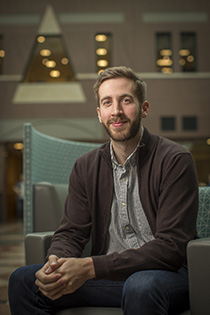Cover Story Sidebar
Toward a more connected Cornell

Collaboration at Cornell Tech in New York City.
With campuses in Ithaca, New York City and Qatar, as well as numerous satellite sites and stations, Cornell University has more than 150 centers, institutes and programs that cut across disciplines and benefit communities across the country and overseas. These connections have become pathways of learning for students like Zachary Strasser '09, M.D./MBA '16, who is pursuing a dual degree at Weill Cornell Medicine and the Samuel Curtis Johnson Graduate School of Management.
For 11 consecutive years, Strasser has journeyed through many interlinked areas of Cornell. As an anthropology major, he was profoundly shaped by a research project in Nepal and by volunteering as a teaching assistant for the Cornell Prison Education Program. Immediately after graduation, he brought his passion for teaching and his love for other cultures to Weill Cornell Medicine-Qatar, where he taught chemistry to students from the Middle East. Energized by the field of medicine, he enrolled at Weill Cornell Medicine in New York City and, in his fourth year of medical school, he received the prestigious Lee Family Scholarship that supports medical students in pursuit of an accelerated MBA degree. While completing this dual degree, he was part of a multidisciplinary team of Cornell undergraduate and medical students, which won first place in the 2016 International Emory Global Health Competition. He also got accepted to his top choice for an Internal Medicine residency: the NewYork-Presbyterian Hospital/Weill Cornell Medical Center.

Zachary Strasser '09, M.D./MBA '16, is pursuing a dual degree at Weill Cornell Medicine and the Samuel Curtis Johnson Graduate School of Management. See larger image
Strasser is eager to explore the intersection of medicine, technology and business, especially in light of new health care policies: "With the implementation of the Affordable Care Act and growing complexity of managed care systems, I expect there to be an increasing need for physicians to navigate both the biomedical underpinnings of a disease and the financial logistics of treatment," he explains. "My internal medicine practice will help me recognize problems that exist in health care, and my MBA will provide me with tools for working toward macro-level changes that will benefit my patients and society."
Huseyin Topaloglu – a professor with joint appointments in the School of Operations Research and Information Engineering in Ithaca and at Cornell Tech in New York City, where he is now based – experiences the university's interconnectedness in other outward-facing ways.
"Apart from Cornell colleagues, I can collaborate with people from the broader New York City ecosystem, both in academia and industry," he says. "All of a sudden my arms and legs have become 10 times longer to reach a much wider group of people a lot more easily."
He adds: "The reason I joined Cornell Tech is because I wanted to move from applicable research to applied research and prove to myself that what I've been doing for years will be useful and have an impact on the real world."
An expert in the science of decision-making using massive data and complex algorithms, Topaloglu collaborates with internal and external peers on problems that range from dynamically setting optimal prices for gym classes and airline tickets to positioning ambulances in real time so they can more quickly respond to emergencies.
Topaloglu says these collaborations multiply his immediately available resources while also enlarging the knowledge and experience of his graduate students who get to learn from experts in and outside of Cornell.
For him, cross-campus and inter-institutional links reflect today's flexible social and technological networks, and also mirror the hubs of Cornell Tech itself: "We're all members of different things for different reasons."
Strengthening collaborations, particularly between Ithaca and New York City, has been one of the goals of Cornell's recently completed capital campaign, which has given rise to interdisciplinary advancements such as Engaged Cornell, the Meinig School of Biomedical Engineering, and the Atkinson Center for a Sustainable Future in Ithaca, the Meyer Cancer Center at Weill Cornell Medicine, and the Jacobs Technion-Cornell Institute at Cornell Tech. Continuing the campaign's momentum to create more connections is a challenge to the Cornell community that the late President Elizabeth Garrett often issued.
"I see a special synergy between our programs in New York City and on our Ithaca campus," Garrett said at a Sept. 21 gathering at Weill Cornell Medicine's Belfer Research Building, where she lauded the far-reaching work of Cornell Cooperative Extension and the New York City program offerings of Cornell's Ithaca-based colleges and schools, as well as partnerships with Weill Cornell Medicine and Cornell Tech.
At the September gathering, Garrett said that the university's many links define its identity: "Cornell is not only established in an amazing college town that facilitates reflection and discussion, but we have a substantial and growing footprint in this great international urban center, full of energy and global connections."